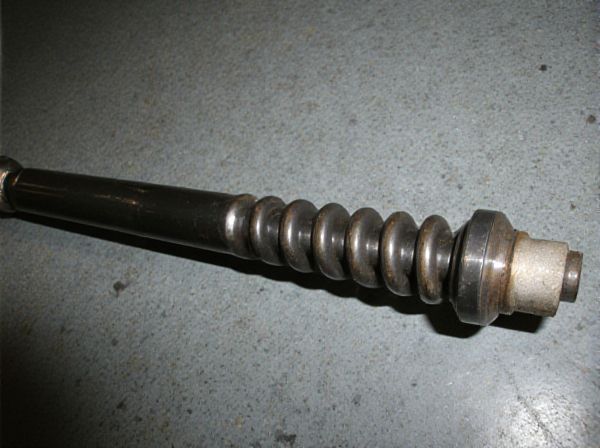
Photo illustration: Solid Driveshaft vs Tubular Driveshaft
A tubular driveshaft offers a significant advantage over a solid driveshaft by providing reduced weight while maintaining strength, improving vehicle performance and fuel efficiency. Solid driveshafts are typically more durable and less expensive, making them suitable for heavy-duty applications where strength is key. Your choice between the two should consider the specific demands of your vehicle and driving conditions to optimize power transmission and handling.
Table of Comparison
| Feature | Solid Driveshaft | Tubular Driveshaft |
|---|---|---|
| Weight | Heavier, reduces performance | Lighter, improves acceleration and fuel efficiency |
| Strength | High strength, durable under heavy loads | Good strength with optimized design |
| Flexibility | Less flexible, prone to vibration | More flexible, reduces vibration |
| Cost | Lower cost, easier to manufacture | Higher cost, complex manufacturing |
| Applications | Heavy-duty trucks, off-road vehicles | Sports cars, performance vehicles |
| Maintenance | Low maintenance due to simple design | Requires regular inspection for cracks |
Introduction to Driveshaft Types
Solid driveshafts offer robust strength and durability, making them ideal for heavy-duty applications, while tubular driveshafts provide reduced weight and enhanced performance through better balance and reduced rotational mass. Both types transmit torque from the engine to the wheels, but tubular driveshafts are often preferred in high-performance and racing vehicles due to their ability to reduce vibration and improve efficiency. Understanding the differences between solid and tubular driveshafts is essential for selecting the appropriate component based on vehicle requirements and driving conditions.
What is a Solid Driveshaft?
A solid driveshaft is a single-piece steel or aluminum shaft that transfers torque from the engine to the wheels, providing strength and durability in high-performance and heavy-duty vehicles. It offers increased torsional rigidity and resistance to twisting forces compared to tubular counterparts, making it ideal for applications requiring maximum power transfer. Solid driveshafts are heavier but less prone to bending, ensuring consistent performance in demanding driving conditions.
What is a Tubular Driveshaft?
A tubular driveshaft is a hollow, cylindrical shaft designed to transmit torque from the engine to the wheels while reducing overall weight compared to a solid driveshaft. Its hollow construction provides improved strength-to-weight ratio, enhancing vehicle performance and fuel efficiency by lowering rotational mass. Commonly made from high-strength steel or aluminum, tubular driveshafts also offer better resistance to torsional stress and vibrations, which contributes to smoother drivetrain operation.
Key Differences: Solid vs Tubular Driveshafts
Solid driveshafts offer enhanced strength and durability due to their one-piece construction, making them ideal for heavy-duty applications and high-torque environments. Tubular driveshafts are lighter and provide improved rotational balance, reducing vibration and increasing performance efficiency in high-speed operations. The primary difference lies in the trade-off between the solid driveshaft's robustness and the tubular driveshaft's weight savings and vibration reduction.
Strength and Durability Comparison
Solid driveshafts offer superior strength due to their single-piece construction, making them highly resistant to torsional stress and impacts. Tubular driveshafts provide enhanced durability through their lightweight design, which reduces rotational mass and improves vehicle responsiveness while maintaining adequate strength for high-performance applications. In demanding environments, solid driveshafts excel in withstanding heavy loads, whereas tubular driveshafts balance strength and durability with weight-saving advantages.
Weight and Performance Implications
Tubular driveshafts are significantly lighter than solid driveshafts, often reducing rotational mass by up to 20-30%, which enhances vehicle acceleration and responsiveness. The reduced weight of tubular driveshafts also lowers drivetrain stress and improves fuel efficiency without sacrificing strength. Solid driveshafts, while heavier, offer durability in high-torque applications but can compromise performance due to increased rotational inertia.
Cost and Manufacturing Considerations
Solid driveshafts typically cost less to manufacture due to simpler machining processes and readily available raw materials, making them a budget-friendly option for standard vehicle applications. Tubular driveshafts involve more complex fabrication techniques such as welding and balancing, which increase production costs but offer superior strength-to-weight ratios beneficial for performance and off-road vehicles. Manufacturing considerations must balance upfront expenses with long-term benefits like durability and weight savings, influencing the choice between solid and tubular driveshafts based on application requirements and budget constraints.
Applications: Best Use Cases
Solid driveshafts are ideal for heavy-duty applications such as trucks and off-road vehicles, providing increased strength and durability under extreme torque and load conditions. Tubular driveshafts excel in performance and racing vehicles due to their lighter weight, which enhances acceleration and reduces rotational mass for improved handling. Both types cater to specific needs where solid driveshafts prioritize toughness, while tubular driveshafts focus on weight savings and high-speed efficiency.
Maintenance and Longevity
Solid driveshafts typically require less frequent maintenance due to their robust single-piece construction, which reduces the risk of joint wear and balancing issues. Tubular driveshafts offer better vibration damping and weight reduction but demand regular inspections for potential cracks and seal integrity to prevent premature failure. Longevity in solid driveshafts is generally higher in heavy-duty applications, while tubular driveshafts excel in performance settings where weight and flexibility are critical.
Which Driveshaft is Right for You?
Choosing between a solid driveshaft and a tubular driveshaft depends on your vehicle's performance needs and intended use. Solid driveshafts offer superior strength and durability, making them ideal for heavy-duty applications and off-road conditions. Tubular driveshafts provide a lighter weight and better rotational balance, enhancing acceleration and fuel efficiency for high-performance and racing vehicles.
 caratoz.com
caratoz.com